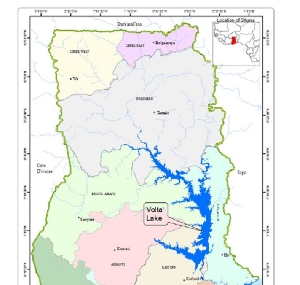On Monday, March 18, 2024, Ghanaians woke up to one outlandish idea by one of the candidates vying for the highest office, the presidency of Ghana. Nana Kwame Bediako (Cheddar) stated in a radio interview that “he will be dredging the sea to Kumasi.”
Many news portals carried the story with too much derision. I listened to his interview, and I scratched my head. In my estimation, there was no point in advocating for a sea in Kumasi. I felt the Volta Lake could serve a bigger purpose by helping with the transportation of vessels and containers across the length and breadth of Ghana, including Ashanti, Bono, Eastern, Northern, Oti, and Volta Regions (Northern, Upper East, and West regions via its tributaries).
Could ships come to the Ashanti and Bono Ahafo Regions via the sea?
I spent the good part of Monday night thinking about possibilities. With my extensive travel experience, I realised that his idea was not extreme after all. Perhaps the sea could not come to Kumasi and Techiman, but cargo ships could.
My knowledge of the UK's Northwest region shows that Manchester has a ship canal that links the River Irwell to the Irish Sea via the River Mersey.
Manchester United’s Old Trafford Stadium is right next door to Manchester Docks and Salford Quays. At the time, the ports of Manchester were the third (3rd) busiest port in the UK. Manchester is inland.
I have lived and worked in numerous countries in Europe, including but not limited to the UK, Switzerland, and the Netherlands. I have had extensive opportunities to travel across most European and North American countries and capitals. My travel experience offers me the opportunity to share my thoughts and perspectives on the idea as espoused by Nana Kwame Bediako.
Europe has several inland and landlocked countries that have shipping ports. In the German city of Frankfurt (the financial capital of the Eurozone), there is a shipping port on the Maine River, yet Frankfurt is not a coastal city. In the mountainous, landlocked terrain of Switzerland, the city of Basel has a shipping port. There is a shipping port in Stuttgart, Germany, which is the headquarters of Mercedes-Benz and Porsche (both car manufacturers). All these cities are linked to the Dutch harbour of Rotterdam via rivers and canals.
Viability and challenges envisaged for the Project:
Regulatory approval, environmental impact assessments, public consultations, and stakeholder engagements will ensure that adequate feasibility studies are conducted. These assessments will help the public understand the economic, environmental, and logistical viability of the project. Critical factors that should be considered include, but are not limited to, terrain, water levels, soil composition, environmental impact, and projected usage.
River Pra and Tano have existing routes. With that in mind, factors to consider include, but are not limited to, existing rivers and terrain, elevation changes, and potential obstacles like roads, railways, or urban areas. Engineers will have to design locks, weirs, channels, and other infrastructure needed to control water flow, manage navigation, and regulate water levels.
The construction team will be involved with excavation, dredging, earthmoving, and the construction of lochs, dams, bridges, and other structures.
The water management team will implement systems for managing water flow, levels, and quality within the waterways to ensure navigation safety, prevent flooding, and maintain ecological balance. This may involve the installation of pumps, gates, and other water control structures.
The navigation and safety team will install navigation aids such as buoys, markers, lights, and signalling systems to guide vessels safely through the waterways to avoid accidents.
The maintenance and operation team will ensure compliance and sustainable procedures are followed to ensure ongoing maintenance and operation of the waterways, including dredging to remove sediment buildup, repairing infrastructure, and managing water levels.
This team will also develop protocols for managing emergencies such as floods, spills, or vessel accidents. Most importantly, this system should be integrated with existing transportation networks. The waterways will be linked to existing transportation networks, including roads, railways, and ports, to facilitate the movement of goods and passengers between the inland area and the sea.
Continuous monitoring of the waterways is paramount for effective operations.
By following these steps and carefully managing the planning, construction, and operation of the waterway, it will be possible to create a navigable waterway on the rivers Pra, Offin, Ankobra, and Tano, among others. This will provide efficient and reliable connections to the sea, benefiting transportation, commerce, and regional development.
It Is Possible And Doable:
To any discerning Ghanaian, the key issue is: could cargo ships travel via the river Pra and its tributaries of Ofin, Anum, and even Birim? Could we construct river canals on the Ankobra and Tano rivers to ensure that Sunyani,
Techiman and Wenchi could serve as inland ports.
Could we connect Ofin, Afram, Pru, and Ankobra with railways to ensure that Ghana becomes one whole shipping port serving our neighbouring landlocked countries, like the port of Rotterdam?
The potential for job creation and the upliftment of communities along the banks of the shipping canals is tremendous. Perhaps we do not have the funds for such laudable projects today; Akosombo Dam and Volta Lake were longstanding projects even before Nkrumah’s time. At the time, our people felt it was not the time to do such projects.
The proponent of the idea has a track record of building projects. Let us not dismiss Cheddar’s ideas as grandstanding and look at possibilities. His idea will transform so many towns and villages along these rivers. I will add that we should not let our historic anxieties about Ashantis and Bonos have access to the sea, clouding such great ideas. After all, this is the 21st century, and it is a century of possibilities. Libya managed to construct water docks in the desert, so it is not out of place for Ghana, with many river bodies, to do this.
By accident or design, Ghana has the chance to create the 21st-century equivalent of what Nkrumah did with the Volta Lake and Akosmbo Dam. We should keep this conversation going due to its huge potential to transform Ghana into a true gateway.
Kwadwo Kusi-Frimpong is a Financial Crime, Governance, and Regulatory Expert, who has extensive experience working with banks and financial institutions in the UK, Switzerland, and the Netherlands. He holds an LLM from the University of Law and is a graduate of the University of Ghana and Said Business School, University of Oxford (Financial Strategy). Kwadwo also appears on GTV’s flagship programmes Market Avenue and Talking Point.
Philip Kyeremateng is a product of Kwame Nkrumah University of Science and Technology, Cranfield University, the University of London, and the Technical University of Denmark. Phillip has considerable experience in managing artificial water bodies in UK. He has worked on several projects with The Canal and River Trust, UK as an Environmental Scientist and leader in charge of dredging, hazardous waste, and emergency preparedness. He is an Environment and Sustainability Leader in Climate Change and Natural Environment Management.
Opinions of Tuesday, 26 March 2024
Columnist: Kwadwo Kusi-Frimpong, Phillip Kyeremateng



















